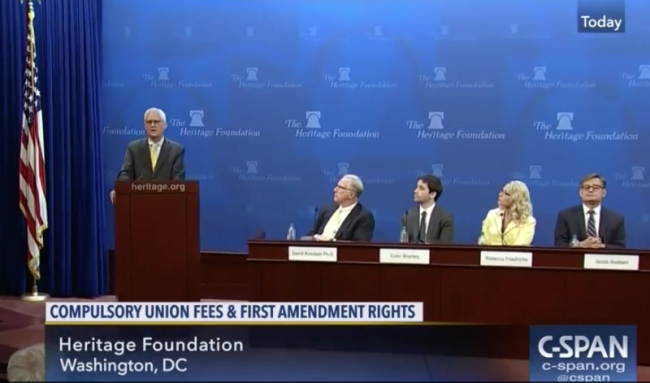Heritage Event: More Worker Freedom in the Future Likely

On August 24, 2017, the Heritage Foundation hosted an event titled, “Protecting Public Employees’ First Amendment Rights: Major Cases Challenging ‘Abood’” as part of National Employee Freedom Week. Dr. David Kreutzer, Senior Research Fellow of Labor Markets and Trade at Heritage, moderated the event.
The panel featured Rebecca Friedrichs, Fellow at the State Policy Network and Lead Plaintiff in Friedrichs v. California Teachers Association; Jacob Huebert, Senior Attorney at the Liberty Justice Center; Dr. Terence Pell, President of the Center for Individual Rights; and Colin Sharkey, National Director of National Employee Freedom Week and Executive Vice President of the Association of American Educators.
Mr. Sharkey, who organized this event, began the discussion by giving an overview of the Association of American Educators (AAE), a non-union, non-profit professional teacher organization in all 50 states. The organization provides professional association benefits to teachers who aren’t part of a union.
AAE also co-founded National Employee Freedom Week with the Nevada Policy Research Institute to focus workers’ attention on worker freedom and educate employees about their rights.
Mr. Sharkey then gave a brief overview of U.S. labor history, starting with President Roosevelt (FDR) signing the National Labor Relations Act into law in 1935, allowing private sector employees to unionize. The act was later amended in 1947 to restrict some of the unions’ activities after violent strikes occurred. This act, known as the Taft-Hartley Act, ended closed union shops and allowed for agency shops.
In 1962, President Kennedy extended collective bargaining rights to federal government workers after some states had done this for their own government workers. The result was that there were more union members in government than private companies. The 1977 Abood v. Detroit Board of Education case followed and forced nonmembers to pay agency fees to the union, purportedly for the cost of collective bargaining. Since then, however, employees have been trying to overturn Abood.
Ms. Friedrichs spoke next about her experiences as a teacher. She explained how teachers’ unions protect bad teachers from being fired at the expense of the children. She also said that it was impossible to opt-out of union membership, and even if teachers did opt out, they still had to pay collective bargaining fees and allow the union to represent them. Despite the fact that they still paid for collective bargaining, they have no vote in the union, can’t go to union meetings, and liability insurance is stripped. Also, the union doesn’t even listen to the teachers who pay dues because they are forced to pay dues. She finally explained how Justice Scalia’s death changed the outcome of her case, but she remained optimistic because there are other cases likely to be decided by the Supreme Court. She ended her speech by asking the audience to educate the teachers they know about their rights and the upcoming labor cases.
Jacob Huebert followed Ms. Friedrichs and explained the reasoning behind the Abood decision. The Supreme Court allowed agency fees because they thought employees wouldn’t have to pay for politics, but these employees would also not free ride off the union.
However, there are problems with this ruling. First, employees still have to pay for politics, contrary to the First Amendment, because collective bargaining is political. Second, while these forced dues supposedly stop free riding, not everyone benefits from the union.
Mr. Huebert next gave the background to his case, Janus v. AFSCME. He explained that the Governor of Illinois had issued an Executive Order forbidding the deduction of union fees from non-union members. The Governor also filed a lawsuit asking the courts to declare that the First Amendment required him to take this action. The unions and Illinois Attorney General responded that the Governor could not sue because he didn’t pay union dues. The Liberty Justice Center and the National Right to Work Legal Defense Foundation then moved to intervene on behalf of several Illinois government employees who had been forced to pay union dues. There is a pending petition before the Supreme Court.
Finally, Mr. Pell spoke about his case, Yohn v. CTA. He described his case as the next step after Janus because the unions will likely try to subvert a good ruling on Janus. For example, the unions might try to keep their current members by forcing them to opt-out through a lengthy and difficult process, possibly every year. Yohn asks the court to strike down opt-out rules and replace them with an opt-in system. The case is, therefore, fighting for the right of teachers to remain silent and not participate.
The major takeaway from this event was that the speakers were optimistic that government workers will likely not be forced to pay agency fees in the future.





